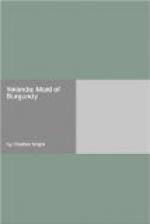The room in which the Burgundian left us was large and clean. There were two beds of sweet straw upon the floor, and to my unspeakable joy there was a bar on the door whereby it could be locked from within. There were also two tubs of water for a bath. On a rude bench was a complete change of clothing which had been brought by some kind hand from the inn. On an oak table were two bottles of wine, a bowl of honey, a cellar of pepper, white bread, cold meat, and pastry. A soul reaching heaven out of purgatory must feel as we felt then. We were too excited to eat, so we bathed, dressed, and lay down on the straw beds.
Before leaving us our captain had said:—
“Do not unbolt your door except to the password ‘Burgundy.’”
We slept till late in the afternoon. When we wakened the sun was well down in the west, and we could see only its reflected glare in the eastern sky. There was but one opening in the room through which the light could enter—a narrow window, less than a foot wide. The light in the room was dim even at noon, but the long darkness had so affected our eyes that the light from the window was sufficient to illumine the apartment and to make all objects plainly discernible. There was little to be seen. The arched roof was of solid masonry; the walls were without a break save the narrow window and the door. Through the window we could see only a patch of sky in the east, reddened by the reflection of the sinking sun; but the sight was so beautiful that Max and I were loath to leave it even for supper.
“We must eat before the light dies,” said Max, whose young stomach was more imperious than mine, “or we shall have to eat in the dark. I have had more than enough of that.”
“Fall to,” I said, as we drew the stools to the table. With the first mouthful of clean, delicious food my appetite returned, and I ate ravenously. Had the repast been larger I believe we should have killed ourselves. Fortunately it was consumed before we were exhausted, and we came off alive and victorious. After supper darkness fell, and Max sat beside me on the bench. He was very happy, for he felt that our troubles would end with the night. I put my arm over his neck and begged him to forgive me for bringing this evil upon him.
“You shall not blame yourself, Karl,” he protested. “There is no fault in you. No one is to blame save myself; I should not have gone to the bridge. I wonder what poor Yolanda is doing. Perhaps she is suffering in fear and is ignorant of our misfortune. Perhaps she thinks I have broken my promise and left Peronne. I can see her stamp her little foot, and I see her great eyes flashing in anger. Each new humor in her seems more beautiful than the last, Karl. Knowing her, I seem to have known all mankind—at least, all womankind. She has wakened me to life. Her touch has unsealed my eyes, and the pain that I take from my love for her is like a foretaste of heaven. I believe that a man comes to his full strength, mental and moral, only through the elixir of pain.”




